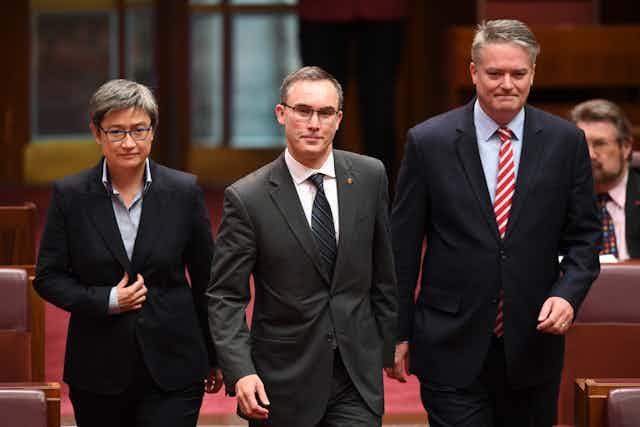Put yourself in the shoes of Tim Storer. The accidental senator from South Australia has one hell of a decision to make shortly after the May budget, when the government plans to bring back its legislation to give tax cuts to big business.
A week ago the Coalition’s fairly confident hopes rested on Storer voting in favour of its A$35.6 billion package. A deal with Victorian crossbencher Derryn Hinch, whose vote also had to be secured, was seen as doable. Then Storer baulked, and the legislation’s future has again become anybody’s guess.
Think of the situation from Storer’s perspective. He has literally just arrived in the Senate, elected to replace a Nick Xenophon Team (NXT) victim of the citizenship crisis but sitting as an independent because of a stoush with his former party.
It’s amazing he’s there at all, and he’s not likely to be there long – one can’t see him re-elected next year. Now he has life-or-death sway over a key measure the government took to the 2016 poll. He has to ask himself whether he should use the extraordinary power that bizarre circumstances have given him to frustrate legislation on which the Coalition can argue it has a mandate.
On the other hand, as he said in his Wednesday Senate statement outlining his doubts about the bill, he is concerned about whether the budget can afford the cuts. And then, he noted, there’s the question of whether the money could be better spent on other things – infrastructure and the like.
When he was sworn in last week, Storer was escorted by the government and opposition Senate leaders, Mathias Cormann and Penny Wong. He chose his escorts. It was to signal his independence, and perhaps to flag that he saw himself as an active player.
He brings to the huge decision before him training in economics, and experience of business, especially in Asia. That presumably helps with evaluating the argument the government makes about the competitive importance of these cuts.
He also comes from a state with a history of federal politicians who focus locally when there are Commonwealth dollars to be had. Nick Xenophon once held up the Rudd government’s $42 billion economic stimulus package while he extracted water concessions that would benefit South Australia.
While Storer has been willing to engage with the government, and will continue to do so, if he eventually voted no, he’d be in line with his former party. The two NXT senators are opposed, despite the government trying to lure them.
Labor, fighting the tax cuts, also observes Storer’s past ALP membership as a sign of his general political orientation and thus perhaps a clue to his final decision.
But the government hopes more talking, more incentives, and perhaps the content of the budget might be enough to persuade him.
Parliament is off until the May 8 budget, when attention will turn from company tax to the government’s income tax plans – which are crucial as it tries to improve the community mood for the election due before mid-next year.
Politically, the budget will be preceded by a media feeding frenzy around the next Newspoll that – barring a miracle for Malcolm Turnbull – will be the 30th in which the Coalition trails Labor.
This will be a diversion, as attention harks back to Turnbull’s invoking 30 Newspolls against Tony Abbott. But with no challenger in sight, it won’t be a decisive moment – just another bout of bad publicity to be endured.
Abbott no doubt will make the most of it. But the more time that passes, the less relevance the former prime minister seems to have, despite a speculative story this week that he might he positioning for a tilt at the opposition leadership if Turnbull loses the election.
Abbott’s decision to launch Pauline Hanson’s book of speeches this week was eccentric and ill-judged.
Can anyone forget his toxic view of her two decades ago, when he established a fund to facilitate legal actions against One Nation and she ultimately ended up in jail? Now he is saying that “if over the last two decades we had been more ready to heed the message of people like Pauline Hanson and less quick to shoot the messenger, I think we would be a better country today”. The bitter enemies have turned into kissing cousins.
Hanson might have mellowed slightly second time around, and she is certainly helping the government in the Senate. But her politics should still be condemned by Liberals, certainly not given the sort of qualified endorsement Abbott extended.
Abbott said the only way the Coalition could win the election was if it could harvest One Nation’s preferences, and “if I can make that more likely, that is a very positive contribution that I can make to the prospects of the Turnbull government”.
His remarks at the book launch suggested a mix of conviction and expediency – regardless, they further fuel cynicism about our politicians.
Speaking of cynicism, one couldn’t miss how quickly some observers segued from the cricket scandal to political behaviour. But as they (rightly) criticise the errant Australian players, politicians would prefer to overlook awkward parallels with conduct in politics – for instance the endemic tampering with the ball of truth.
On Tuesday a fired-up Turnbull told a news conference: “I think there has to be the strongest action taken against this practice of sledging. It has got right out of control, it should have no place … on a cricket field.”
Absolutely. And also it has got out of control on the political field. But when a journalist interjected with “doesn’t it happen in parliament?”, Turnbull chose to let that pass without response.

